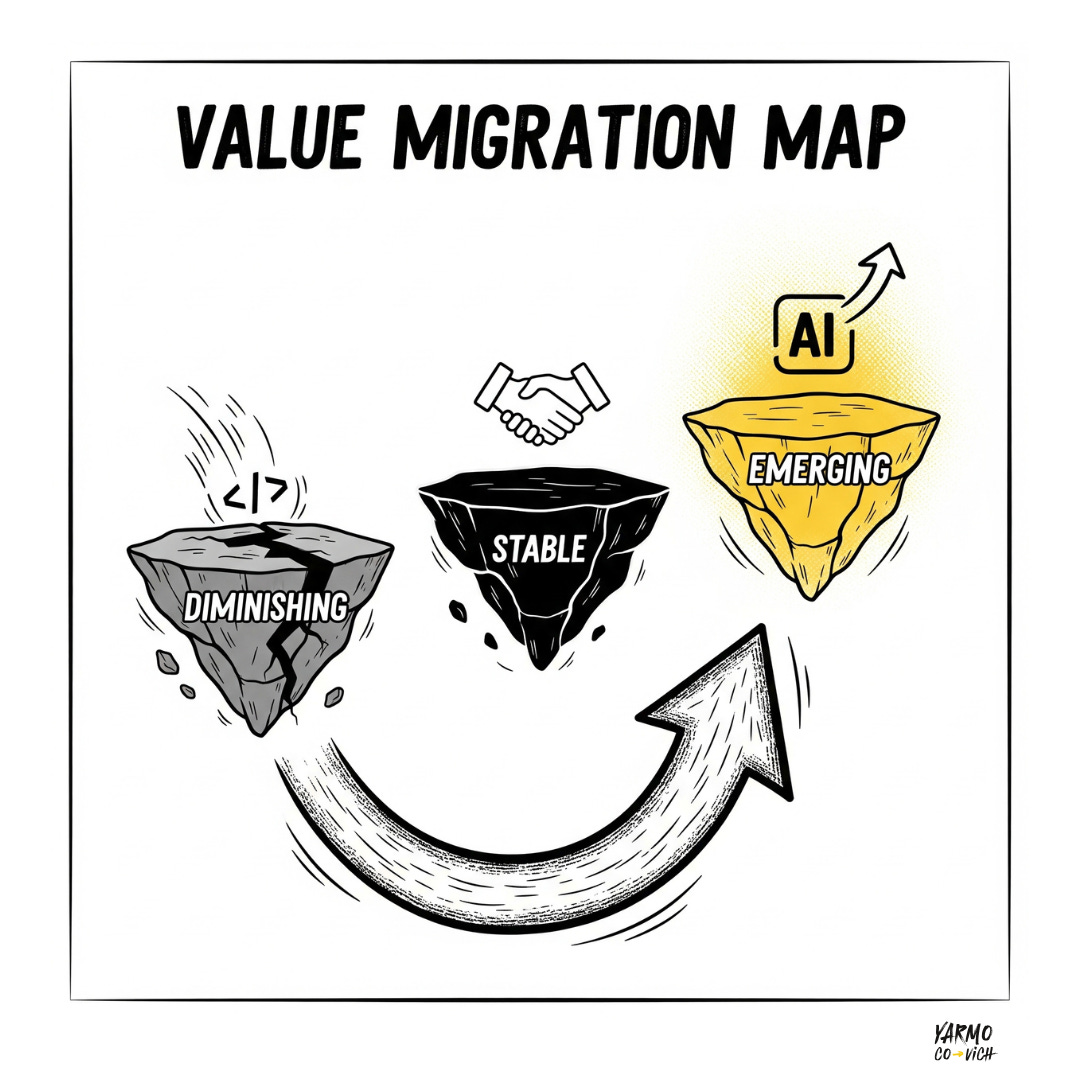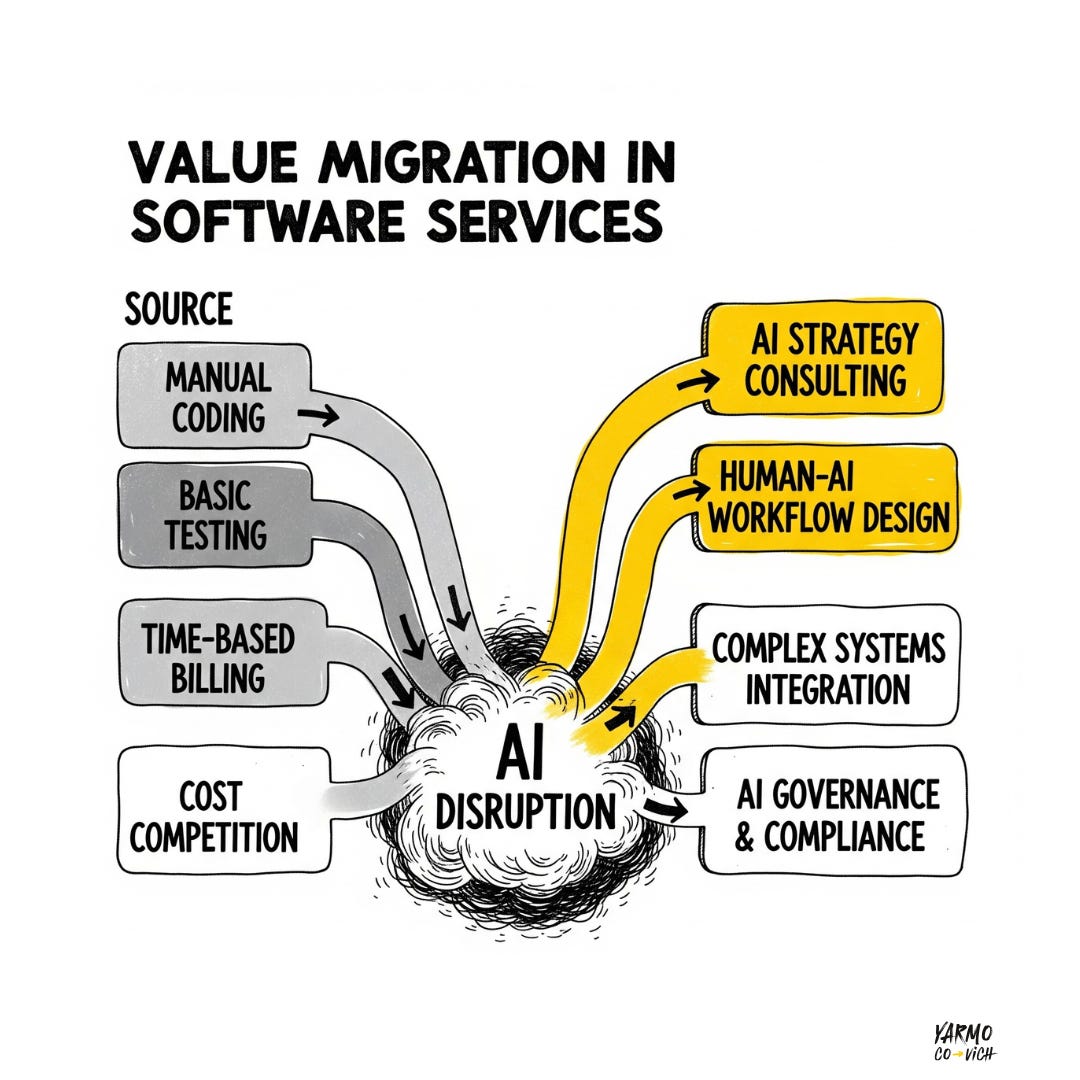Beyond Code & Costs: Where Value is Shifting in the AI-Augmented Software Industry
This is Part 2 of a 4 part series exploring how CEE software agencies can thrive as AI transforms our industry. Calin Muresan and I developed these insights through weeks of intensive collaboration in March-April 2025, examining potential futures for software services in an AI-dominant landscape.
TL;DR: As AI automates routine technical work, value is migrating toward strategic insights, complex integration, and human judgment. We map which services are losing value, which remain stable, and where new opportunities emerge.
"Where does value move?" Calin asked during one of our sessions. It's the question that changes everything.
When basic technical implementation becomes commoditized - when AI can generate functional code in seconds, automate testing, and create documentation - the entire economics of software services shifts. But here's what I've learned: this isn't random destruction. It's predictable migration.
Through our workshops, Calin and I developed a framework that makes sense of this chaos. Think of your services as living in three territories:
Diminishing Value - where AI automation erodes margins and commoditizes skills
Stable Value - where human judgment and relationships maintain their worth
Emerging Value - where new opportunities command premium rates
Understanding which territory each of your services occupies isn't academic exercise. It's your evolution roadmap.
What's Losing Value Fast
Three areas are losing value rapidly:
Routine Implementation Tasks are the first affected. Basic CRUD operations, standard UI components, boilerplate code generation - these are AI's sweet spot. When GitHub Copilot can boost developer productivity by up to 75% in specific use cases, when AI generates test cases and automates deployment scripts, the premium for basic coding evaporates.
Cost-Based Advantage follows close behind. Just being cheaper isn't going to cut it anymore. Calin had conversations with agencies in Poland who are finding that their traditional price advantage is quickly evaporating as AI tools level the playing field.
Time-Based Billing Models simply break. How do you justify billing 40 hours for what AI accomplishes in a fraction of that? You don't. Truth is, this model was already flawed - it never really encouraged efficiency. Why finish faster when you're paid by the hour? AI just exposed what was always broken. The entire economic equation needs rewriting.
Consider this: deployment time for enterprise machine learning applications has dropped from months to weeks thanks to AI automation. When Infosys developers generated over 7 million lines of code using GitHub Copilot, the implications became clear - basic code generation is becoming a commodity at unprecedented scale.
What Holds Its Ground
Not everything loses value. These areas remain strong because they require something AI hasn't mastered:
Operational Excellence - reliably delivering quality results - never goes out of style. Even with all the AI tools in the world, someone still needs to make sure everything works together properly.
Complex Technical Problem-Solving remains firmly human. System architecture decisions, performance optimization, debugging complex integration issues - these need pattern recognition born from experience. AI assists but can't replace the intuition that says "something's wrong here" when all tests pass.
Domain Knowledge and Business Context prove remarkably durable. Understanding healthcare compliance, financial regulations, or manufacturing processes - and more importantly, knowing how technology serves these domains - requires human judgment. Clients pay for partners who grasp their industry's unwritten rules.
Trust and Relationship Building might sound soft, but it's rock-solid value. I've heard this from multiple clients: "We can replace coders, but we can't replace partners who understand our business." That trust, built through years of collaboration, surviving failed projects and celebrating successes, isn't downloadable.
Strategic Guidance becomes more valuable as options multiply. With AI tools everywhere, clients drown in possibilities. They need advisors who can say "yes, you could build that, but should you?" This becomes even more critical when AI makes it trivially easy to generate code - the temptation to over-engineer solutions multiplies. This requires business acumen that goes beyond technical capability.
Where New Value Emerges
Here's where I get excited. These emerging areas don't just maintain value - they command premium rates:
AI Strategy and Implementation tops the list. Not just using AI tools, but understanding which problems AI actually solves versus which it complicates. I know agencies charging consulting rates for AI readiness assessments and roadmapping.
Human-AI Workflow Design creates entirely new service categories. Organizations need help designing systems where humans and AI complement rather than compete. This isn't about tools - it's about reimagining how work happens.
Complex Systems Orchestration grows critical as software becomes more distributed and AI-powered. MLOps (Machine Learning Operations) and LLMOps (Large Language Model Operations) expertise commands premium rates. Someone needs to make all these pieces work together reliably.
Responsible AI Governance emerges from necessity. Ensuring AI systems remain fair, transparent, and compliant isn't optional anymore. With only 2% of companies having fully operationalized responsible AI practices, agencies with genuine expertise here differentiate themselves immediately.
Outcome-Based Partnerships flip the entire model. Instead of "we'll build this feature," it's "we'll improve your conversion rate by 20%." Taking responsibility for business results, not just technical delivery, changes everything.
Look at the real results: banks reducing fraud losses by 50% using AI, telecom companies saving $7 million annually through AI-driven knowledge centers. These aren't just efficiency gains - they're transformative business outcomes.
The Pattern Behind the Shift
Step back and the pattern becomes clear: value migrates from technical execution to strategic judgment, from isolated tasks to integrated outcomes, from following specifications to challenging assumptions.
The key insight that emerged from our analysis? AI handles craft - the technical skills anyone can learn. But wisdom - knowing when to break rules, understanding unstated needs, seeing connections others miss - remains stubbornly human.
Consider this: while AI helps product managers save 10-30% of time on routine tasks, the real value emerges when they use that saved time for strategic thinking. The skills required in AI-influenced occupations are changing 25% faster than in other fields. This isn't just about working faster - it's about working fundamentally differently.
The big picture? AI is definitely automating routine tasks, but it's simultaneously creating demand for higher-level human capabilities - strategic thinking, complex problem-solving, domain expertise, ethical judgment, and the ability to effectively orchestrate AI systems.
Looking at your own service offerings, which of these emerging areas aligns best with your existing strengths? What could you realistically start developing in the next six months?
— Yarmo Covich & Calin Muresan
In the coming articles of this series, we'll explore:
Article 3: The uniquely human capabilities that become your competitive edge
Article 4: A practical roadmap for transforming your agency to thrive in the AI era
Next: The Human Edge: Cultivating the 'Human Wisdom' AI Can't Automate
Previous: The End of the Cost Game: Why CEE Software Agencies Must Find New Value in the AI Era






